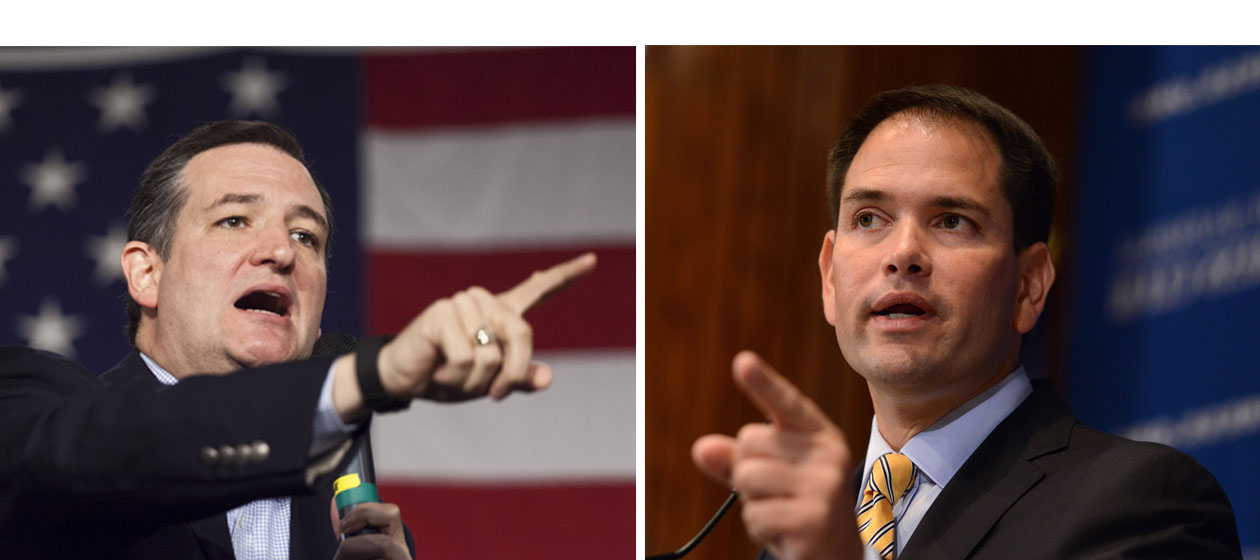What the Ted Cruz-Marco Rubio tax war is all about
Begun the tax wars have!


A free daily email with the biggest news stories of the day – and the best features from TheWeek.com
You are now subscribed
Your newsletter sign-up was successful
Ted Cruz and Marco Rubio have been battling hard over immigration, each hoping to become the clear Republican presidential favorite once GOP voters awake from their Trumpian fever dream. Now a new front is emerging between the two candidates: Begun the tax wars have!
Of course to Democrats, the idea of Republicans fighting over taxes may seem ridiculous. What's there to fight about, really? Aren't all their tax plans pretty much the same? Cut taxes massively for the rich and hand-wave away budget concerns with tired promises about superfast economic growth?
There is some truth to that criticism. Cruz and Rubio have each presented plans that would lose trillions over the next decade, assuming no strong economic feedback. And the richest Americans would certainly see much lower tax bills. But there are key differences, and it is over those differences that their tax war will be waged.
The Week
Escape your echo chamber. Get the facts behind the news, plus analysis from multiple perspectives.

Sign up for The Week's Free Newsletters
From our morning news briefing to a weekly Good News Newsletter, get the best of The Week delivered directly to your inbox.
From our morning news briefing to a weekly Good News Newsletter, get the best of The Week delivered directly to your inbox.
Rubio was first to engage, with an attack Monday on the Cruz plan as an "intentionally sneaky" idea that could lead to "a dangerous expansion of Washington's power." What Rubio is referring to is a feature Cruz calls a "business flat tax." But it is really a 16 percent valued-added tax somewhat similar to what's common in many other advanced economies. VATs have long been anathema on the right due to concerns they would give government an additional revenue stream — Cruz would combine his VAT with a 10 percent flat income tax — and that they are effectively hidden from voters. As Grover Norquist of the anti-tax group Americans for Tax Reform pointedly tweeted: "VAT is a French word for Big Government."
Rubio makes some valid points.
VATs are one sort of consumption tax, and economists generally agree that consumption taxes allow government to raise revenue with less harm to growth than income taxes because they don't penalize savings and investment. Many left-leaning economists who favor expanded government spending also favor VATs to pay for it. Back in 2009, some Democrats favored a VAT as a way to finance President Obama's proposed health care reform and to reduce the budget deficit. The Tax Foundation calls Cruz's version of a VAT "a powerful tax that captures pretty much all of the income in the country." Without his VAT, it would have been nearly impossible for Cruz to propose his low flat tax without eviscerating government revenue.
If and when the Cruz counterattack comes, it seems likely to focus on two aspects of Rubio's tax plan. First, Rubio lowers the top income tax rate less than any other GOP candidates, to 35 percent from the current 40 percent. Second, Rubio would expand the use of tax credits to funnel immediate tax relief to working class and low-income voters. According to Tax Foundation models, the Rubio plan "provides the largest benefits to the lowest-income Americans." For instance: The bottom tenth of households would see after-tax incomes rise by 44 percent, and 56 percent when accounting for faster economic growth. As the supply-side wing of the GOP sees it — such as the Wall Street Journal's editorial page — every dollar not "spent" on lowering top rates is a dollar wasted.
A free daily email with the biggest news stories of the day – and the best features from TheWeek.com
In this way, the Rubio plan is in the tradition of politically successful GOP tax reform. Both presidents Ronald Reagan and George W. Bush passed tax cuts that improved growth incentives and provided broad tax relief. The Cruz plan is more of a bet that cutting taxes for business and the wealthiest will massively boost GDP growth with resulting income gains broadly shared. Certainly if either is elected, their tax plans would need significant revision, if only to sharply reduce likely revenue losses.
For now, however, both candidates are effectively signaling something about how they see the world. For Rubio, it's that the modern American economy — one pressured by globalization and automation — needs deep structural reform to boost economic growth, but that alone may not provide shared prosperity. For Cruz, it's the traditional GOP axiom that a rising tide of economic growth will always lift all boats. Each plan has its strengths and vulnerabilities.
Thursday's GOP debate should show how adeptly Cruz and Rubio can make their cases.
James Pethokoukis is the DeWitt Wallace Fellow at the American Enterprise Institute where he runs the AEIdeas blog. He has also written for The New York Times, National Review, Commentary, The Weekly Standard, and other places.
